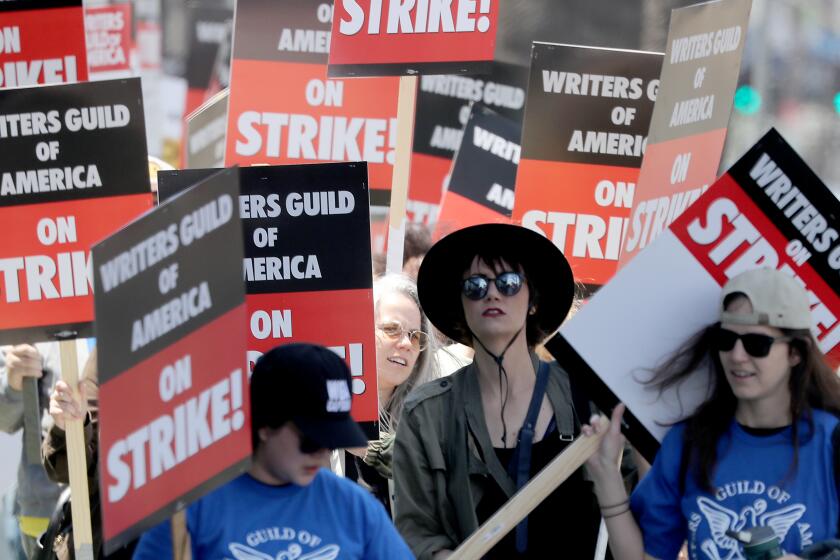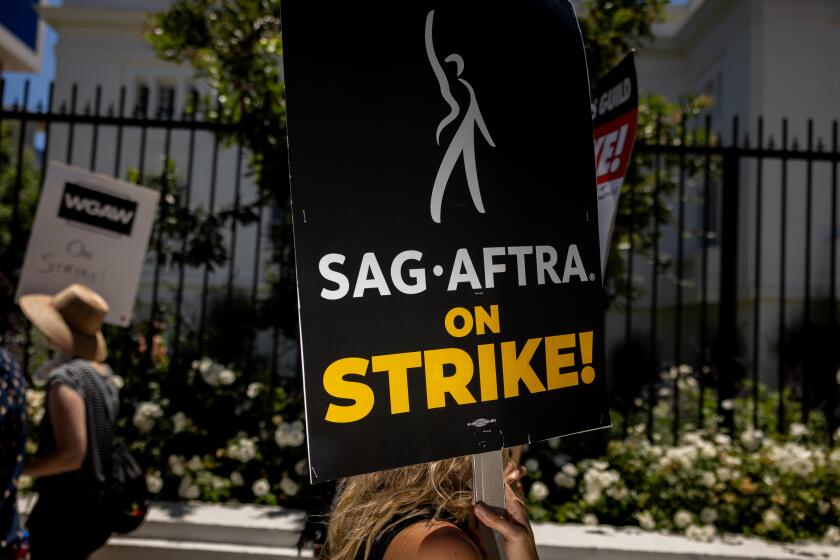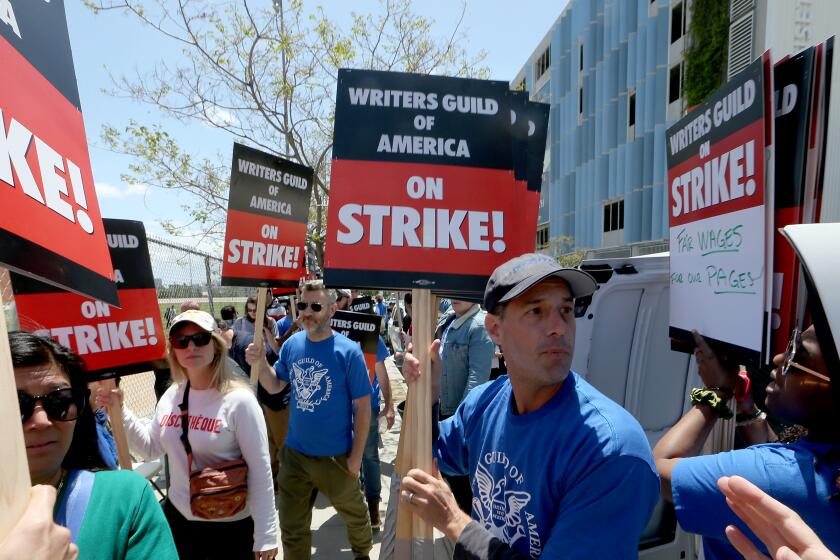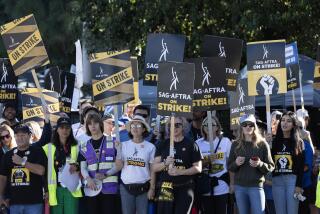AMPTP says it will meet with WGA next week after long standstill
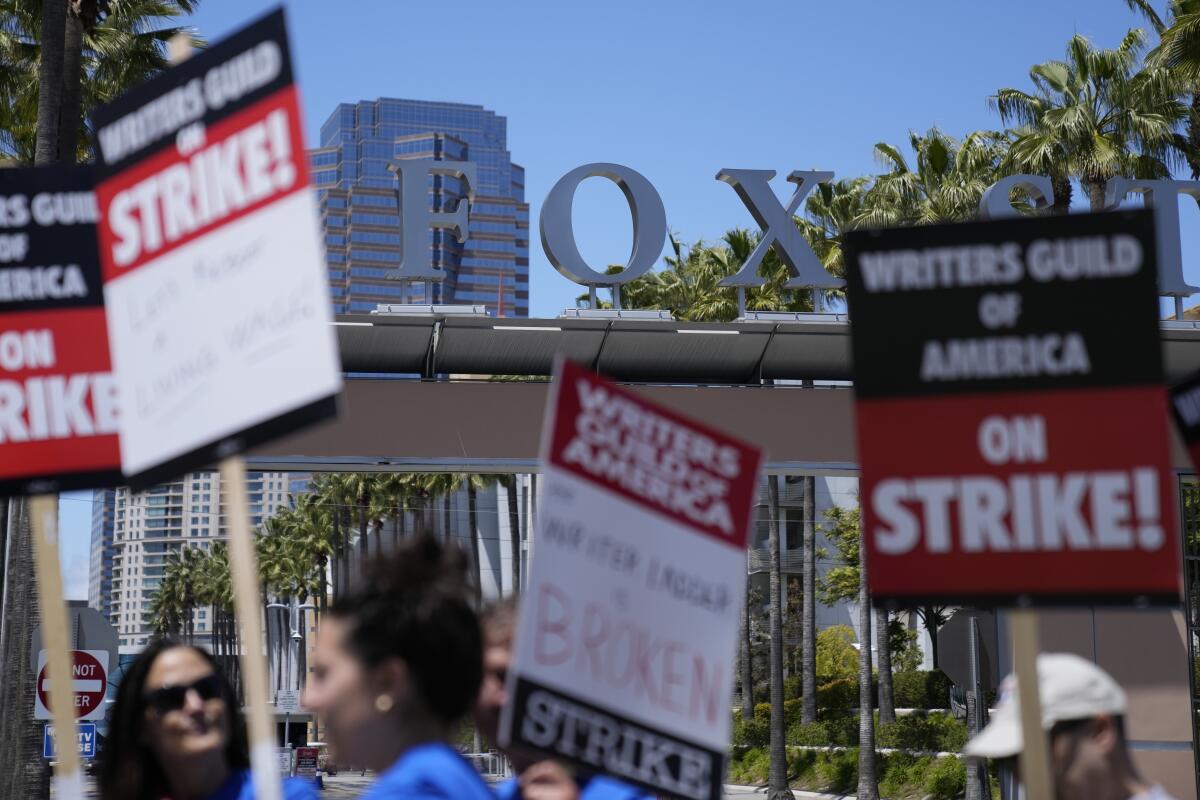
- Share via
The Alliance of Motion Picture and Television Producers said Thursday that it planned to schedule a meeting with the Writers Guild of America next week, the first genuine sign of movement in the labor standoff since last month.
The alliance, which represents major studios such as the Walt Disney Co., Netflix and Warner Bros. Discovery, said that on Wednesday the WGA had “reached out to the AMPTP and asked for a meeting to move negotiations forward.”
“Every member company of the AMPTP is committed and eager to reach a fair deal, and to working together with the WGA to end the strike,” the studio group said in a statement.
WGA’s negotiating committee confirmed the development in a note to members on Thursday. It said guild leaders and the AMPTP “are in the process of scheduling a time to get back in the room.”
The announcement comes after weeks of little progress in resolving the impasse. The sides last met Aug. 22, when chief executives of multiple studios and AMPTP President Carol Lombardini gathered with WGA negotiators. The meeting went badly.
The 2023 writers’ strike is over after the Writers Guild of America and the Alliance of Motion Picture and Television Producers reached a deal.
Writers have been on strike since early May.
Key issues include minimum staffing in writers rooms, artificial intelligence‘s threat to their jobs, and streamers being more transparent with viewership data so that writers can be financially rewarded for streaming hits.
Actors joined the writers on the picket lines in mid-July, resulting in dual Hollywood strikes that have halted many productions and hurt the finances of entertainment-related businesses, including prop houses and talent agencies.
SAG-AFTRA has approved a deal from the studios to end its historic strike. The actors were on strike for more than 100 days.
The studios’ statement follows a back-and-forth between the two sides over who was supposed to make the next move — the companies or the writers?
The WGA negotiating committee has said that the studios on Aug. 22 told them their Aug. 11 proposal “had to be the basis for the only deal they were willing to make.” The writers guild said it presented a counterproposal to AMPTP on Aug. 15.
AMPTP has claimed it was waiting on the WGA. The alliance said in its version of the timeline that it last presented the WGA with compromises on Aug. 18 and that the “WGA indicated it would respond the following week. AMPTP has not heard from the Guild since that time.”
California Gov. Gavin Newsom has been wary about appearing as if he’s siding with labor unions or film studios as the Hollywood strikes continue.
Thursday marked the 136th day of the writers’ strike.
The finger-pointing contributed to a nearly three-week delay in negotiations at a time when individuals, including below-the-line crew, are increasingly feeling the financial pain of going nearly five months without a paycheck.
The economic toll on California is increasing the longer the strikes last. The hit could balloon to $4 billion to $5 billion if the strikes stretch into October, according to an estimate from Todd Holmes, associate professor of entertainment media management at Cal State Northridge.
WGA’s negotiating committee co-chair Chris Keyser said in a video released on Labor Day that “we are not on strike out of greed. Nor do we begrudge the companies their success or deny their struggles.”
“But the changes the companies have orchestrated in the business have made the profession of writing untenable for us and for everyone who comes after us,” Keyser said. “Our feet and backs may ache, but our cause is the same.”
WGA negotiators also are scheduled to meet with several prominent TV showrunners, including Kenya Barris and Noah Hawley, on Friday to discuss strategies for moving the talks along. People close to the showrunners said the writer-producers simply wanted to get information and offer assistance to the guild if it needed their help.
Studios have been feeling the pain of the strikes, delaying film releases and suspending overall deals for producers. Warner Bros. Discovery said its profits for the year could be up to $500 million less than expected, mainly because of the strikes.
Actress Drew Barrymore announced last weekend that she had made the difficult decision to return her New York-based daytime talk show to production without the show’s writers. The fourth season of her show, produced by CBS Media Ventures, is scheduled to premiere next week. In a statement, she said she hoped for a “resolve for everyone as soon as possible.”
Viewership data from streaming services such as Netflix and Disney+ has become a major sticking point in the writers’ and actors’ strikes.
Late Wednesday, HBO talk show host Bill Maher followed suit, saying he was gearing up his Los Angeles-based show to resume production because the strike had gone on too long.
“It has been five months, and it is time to bring people back to work,” Maher said in a X (formerly Twitter) post. “The writers have important issues that I sympathize with, and hope they are addressed to their satisfaction, but they are not the only people with issues, problems, and concerns.”
On Thursday, the WGA picket lines outside Television City in the Fairfax district were abuzz with consternation over Maher’s move. His HBO show is filmed in a soundstage behind the picket lines near the historic Farmer’s Market. At the check-in desk there was a framed photo of Maher with a sticker plastered over his chest with one word – “SCAB.”
Meanwhile, SAG-AFTRA has said it is still waiting to hear back from AMPTP to set a date on when its negotiations can restart. AMPTP on Wednesday declined to comment on the stalled talks with the actors guild.
“Hot labor summer is about to be empowered worker autumn and we’re all gonna be a part of that,” said Duncan Crabtree-Ireland, chief negotiator for SAG-AFTRA at a Wednesday rally.
Times staff writer Yvonne Villarreal contributed to this report.
More to Read
Inside the business of entertainment
The Wide Shot brings you news, analysis and insights on everything from streaming wars to production — and what it all means for the future.
You may occasionally receive promotional content from the Los Angeles Times.
